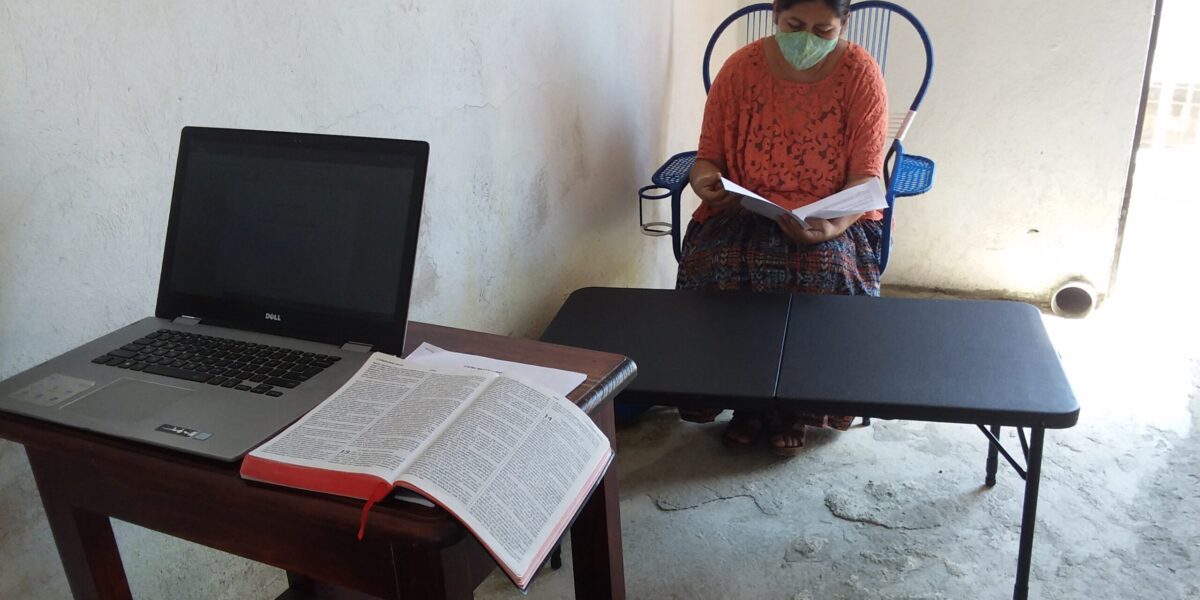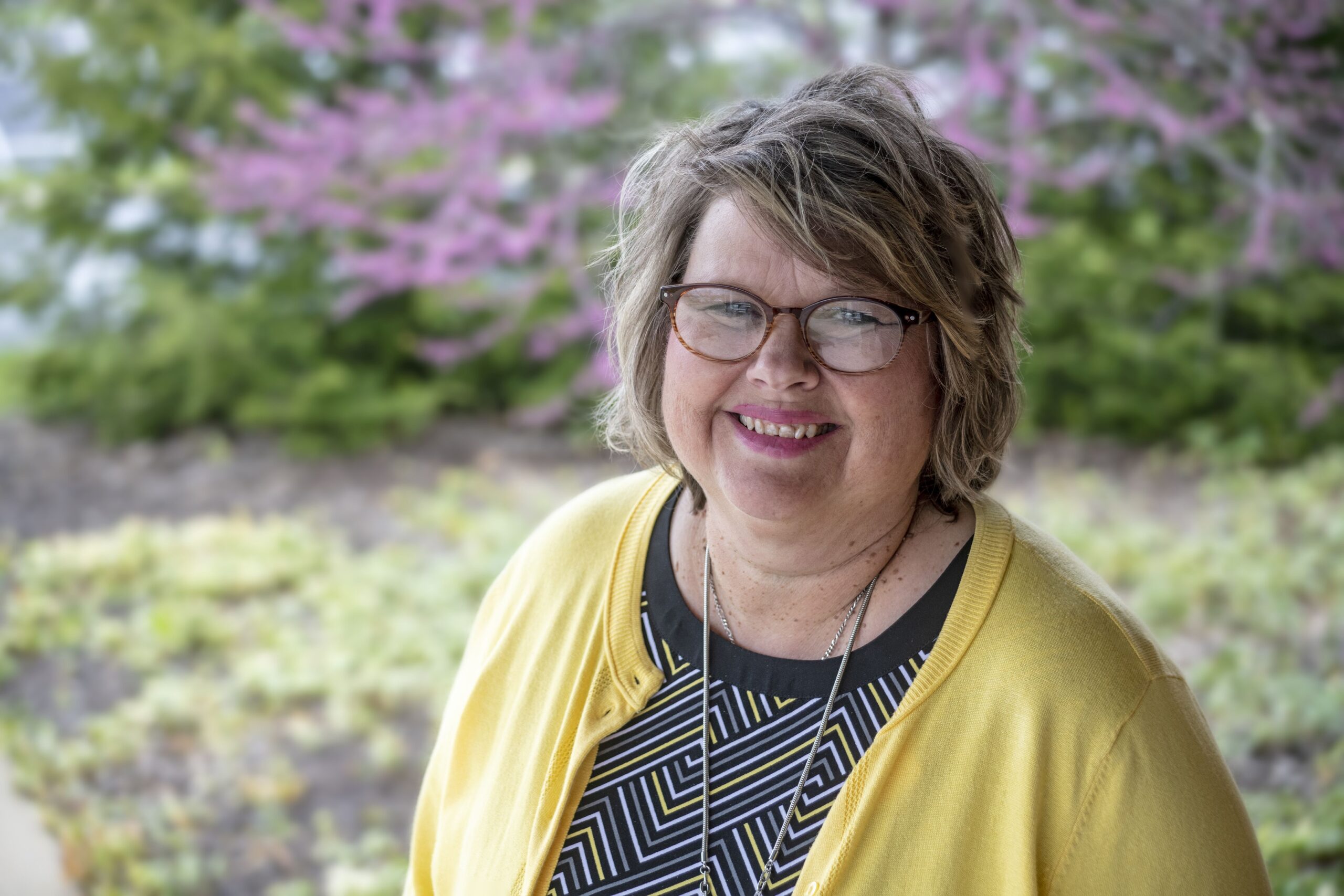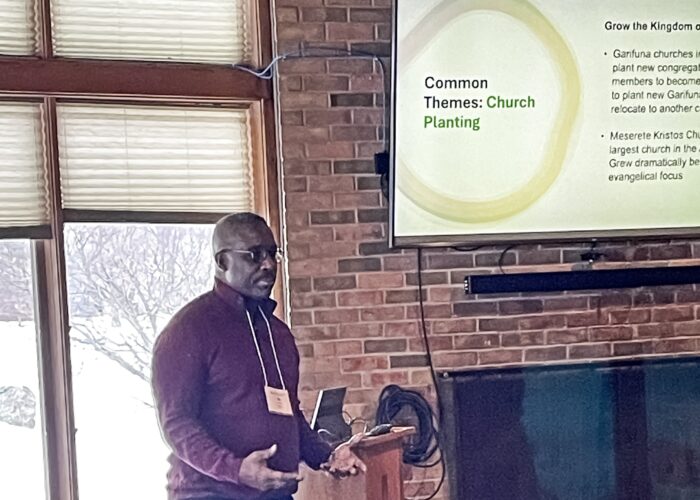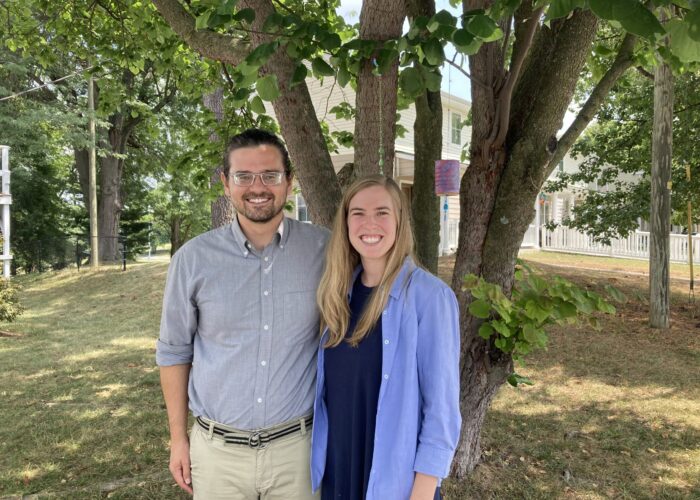To mark the first anniversary of the COVID-19 pandemic, Mennonite Mission Network writers sought reflections from global partners and workers. Below is the fourth and final reflection in a series on how the pandemic has invited communities to receive God’s grace for seeking new ways of doing ministry. Here are the first, second and third stories in the series.
Deb Byler, who serves with Mennonite Mission Network in Guatemala among the Kekchi women, discovered that being quarantined during a pandemic is one way to find time to write.
"A silver lining in [the pandemic] is that I have been able to write many booklets, including one on the coronavirus, with a theology of illness and God’s healing power," Byler wrote in a recent email. "I was wondering when I would have the time to do the writing I wanted to do."
She described how she has completed a first draft of many booklets and is in the process of reviewing them with two Kekchi women editors. Currently, at least six booklets have been printed and many more are in varying stages of production, she continued.
Even though the lockdown provided more time for the healthy outlet of writing, Byler suffered from isolation, depression and anxiety. "But I got through that with some help from a therapist from the States that I had worked with previously," she wrote.
To date, not many Kekchi people seem to have died from the coronavirus, though Byler wrote that a lack of widespread testing in the country makes it difficult to determine the actual statistics. The low death rate has caused Byler to wonder if this is God’s answer to a people who has given itself to prayer because of the virus. Or, is it because they are more isolated, due to travel restrictions, with prices for public transportation spiking when travel resumed?
"I don’t know for sure why the Kekchi people have not been hit hard by the pandemic, but I am thankful that my worst fears were not anywhere realized, and I was protected, too," Byler wrote.
Praying in Peru
Along with Byler, many other Mission Network workers and partners are making shifts in their ministries during the pandemic, including Elena and Freddy Satalaya, in Iquitos, Peru. They serve with Iglesia Cristiana Menonita del Peru (Mennonite Christian Church in Peru) in children’s and youth ministries.
"As Peru went into a strict lockdown, many workers had no way to earn money from home, and we worried deeply," Elena Satalaya wrote. "These families buy their daily bread with their daily earnings and do not have savings accounts. We wondered: How could we minister with such families with no option of being face-toface with them? What was our purpose as missionaries if we weren’t allowed to go be present with the people in ministry?"
To meet these challenges, they devoted themselves to prayer in ways they never had before. "Perhaps we couldn’t be present when it was most needed, but the Holy Spirit certainly could," she wrote. "We prayed in our home for our ministry and joined together with hundreds of Christians [in] Iquitos to pray for the healing of the city. It was one of the cities hit hardest by the coronavirus in South America. There is so much power in prayer, and we saw this more than ever in 2020."

Grober Gonzalez (front) brought his son Diego Gonzalez to Pastors Juan Carlos Moreno and David Moreno for prayer for healing in Iquitos, Peru. Photo by Linda Shelly.
She described how one desperate Sunday, all city churches took turns praying for an hour for the complete healing of Iquitos. The prayer began at midnight and continued for 24 hours. "That very week, the number of COVID-19 cases declined for the first time since the pandemic had arrived in Iquitos," she wrote. "Soon hospitals started to re-open, with few to no cases in them. Iquitos reached the point where there were no new cases throughout the city for several months."
Cases have now begun to reappear, though they are few and far between. "We believe that God heard our pleas that scary Sunday when we placed the city’s situation in [God’s] hands," she wrote. "And [God] came through in the kind of way only God can."
Stepping up prayers for Africa
In a recent email exchange between Sharon Norton, co-director for Africa and Europe, and Fernand Kpossilande, who lives in Benin and works for ONG Bethesda, the topic of COVID-19 vaccines arose. Norton expressed gratitude about getting vaccinated herself, while lamenting the lack of supply for countries like Benin.
Kpossilande wrote back: "It’s wonderful news, above all in the U.S., where the virus killed so many people. Yes, the poorer countries have to wait. We’ll be praying to God to protect us during this waiting period, and we hope that our work for justice and peace will contribute to implementing more justice in the world. A first shipment of vaccines has been recorded in our country, and it is intended for health professionals, first. We also thank God that the contamination is not high in Benin."
In addition to his work with human resources in the Bethesda organization, Kpossilande leads a grassroots campaign, amid COVID-19 restrictions, for a peaceful, fair presidential election in Benin, which has been threatened by violence against opposition parties and civil unrest. Benin has been a model country for democracy, and this political tension has many worried. The election is set to take place April 11.

During a Bible study in Benin on biblical models of restorative justice, Luc Sossou (left) and Moïse Santos pass candle light to each other to symbolize their commitment and hope for what they learned in that session. Photo provided.
Steve Wiebe-Johnson, Mission Network’s co-director of Africa and Europe with Norton, also requests much prayer for Benin and other communities in Africa. While there is loss due to COVID-19, stories abound of people sharing in creative ways in Ghana, Nigeria, Democratic Republic of Congo and South Africa.
"They share what they have materially, as well as the love of God," Wiebe-Johnson said. "In both the emotional and economic aspects of this crisis, the church seeks to be the church and live out its calling to be a source of healing and hope in a world that seems to be falling apart."
Making practical personnel changes in South Africa
Along with changes in prayer and food ministries, the work of keeping ministries going while they adapt to COVID-19 challenges continues. Oscar Nceba Siwali, founder and director of Southern African Development and Reconstruction Agency (SADRA), a Mennonite Mission Network partner, recently wrote that new personnel changes have yielded positive results.
For example, the hiring of a 34-year-old finance professional has improved SADRA operations. "She has resolved a two-year-old problem with our South African Revenue Services, resulting in them finding out they owe SADRA money. Also, her IT abilities are beyond measure, and the things she is able to do at the push of a button are like miracles."
SADRA has also added another leased office space, as per government requirement for workplaces. "We are no longer crammed into one office … I have my own office to keep me away from the younger staff for health and safety purposes," he wrote.
Ministering in Mongolia
Workers and partners in Mongolia are giving healing and hope by providing food and fuel to people in need, reports in the February 2021 issue of Horizons indicate. Horizons is a newsletter of JCS International, a consortium of mission agencies through which Mission Network serves in Mongolia.
Workers have implemented these activities through local partner organizations. Many church leaders are adapting their work to include personal phone calls and individual meetings when permitted. Facebook groups are widely used for services, and online groups have formed to share prayer and fellowship.
A parallel crisis occurred in the countryside. Herders in eight provinces were hit by extreme snowfall and there is not enough grass for the animals. Many were forced to reduce their herds by 75 percent to keep the rest alive. However, this is not enough for the herder families to live on. JCS and its local partners have provided hay, fodder and food to these herders.
An email encouraging global partners to cling to God in tough times recently came from Laura Schlabach. She supports longer-term development projects through her work in the JCS finance department in Mongolia, and she serves as a member of the JCS leadership team.
"Several volunteers left the country without knowing when they may return," Schlabach wrote. "Through all the unknowns and uncertainties, restrictions and lockdowns, there has been a sense of identifying with others around the world. And through it all, we return again and again to ’God is sovereign,’ and ’God is in control.’ We must depend on [God]. We are so thankful for this."
Video update from Botswana
Editor’s note: In the video above, Sazini Mpala Nkosi shares how God is providing grace to meet the challenges in Botswana. She lives there with her husband, Lyenor Lionel Nkosi, author, playwright, and political activist. He was tortured in Zimbabwe. After fleeing to Botswana, he encountered Mission Network personnel who, among others, helped him find freedom and new ministries. See the account of their journey here.





